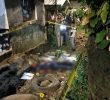Makapili method
The use of hooded �ratters� — stool pigeons, if you will — or faceless informers who can trigger the arrest and detention without judicial warrant of persons suspected of having committed terrorism recalls the evil facets of the Spanish Inquisition of the 14th century or the Makapili era during the Japanese occupation of our country. Those finger-pointers are technically �witnesses� against the �suspect� who he or she won�t be able to confront as required by Sec. 14, Art. III of the Constitution. Obviously, the use of anonymous witnesses has no place in a modern, democratic society.
The great danger is that once the Bill becomes law, unless refined, it will cripple the human rights and curtail the civil liberties of any person who is pointed to as a suspect in the crime of terrorism.
Bill of Rights, undermined
Of the 22 sections of the Bill that cover suspects in the crime of terrorism, four sections severely undermine the constitutional guarantees in the Bill of Rights. These are sections 7, 18, 26 and 38.
1. Sec. 7 authorizes the surveillance, interception and recording of communications, conversations, messages of persons suspected of the crime of terrorism.
The section legitimizes the police surveillance of the movements of the suspects of the crime, the surreptitious search of their homes, offices and places of leisure, and the electronic recording of their communications by methods that include such advance technology as magic lanterns, trace and trap, and other devices.
2. Sec. 18 allows the arrest without judicial warrant and the subsequent detention of any person suspected of the crime of terrorism. Originally the detention was for not more than 15 days but as amended, it has now been reduced to not more than 3 days.
The section legalizes police arrest and incarceration of suspects upon the mere say so of their informants or assets.
3. Sec. 26 empowers the police or law enforcement officials by order of the Court of Appeals to examine the deposits, placements, trust accounts, assets and records of a person suspected of the crime of terrorism.
The examination may be done ex-parte, that is, behind the back of or without notice to the person concerned. The hazardous import of the section to the human rights and civil liberties of people may not be felt unless it is tied up with the fourth section we had adverted to earlier and that is Section 38 of the Bill.
4. Sec. 38 authorizes the �seizure and sequestration� of the bank deposits, placements, trust accounts, assets and records of a suspect of the crime of terrorism. The section also sanctions the seizure and sequestration of the suspect�s �moneys, businesses, transportation and communication equipment and other implements, and properties of whatever kind and nature�.
It is vital to note that the person whose �properties of whatever kind and nature� are seized and sequestered under the section is someone who is not yet convicted of the crime of terrorism. He or she is not even accused of terrorism. He or she is, to put it bluntly, a mere suspect.
Terrorism









